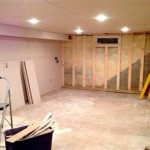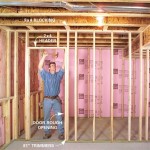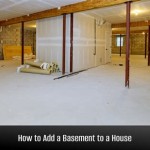Does Insurance Cover Water Damage In Basement?
Water damage in a basement is a common and potentially devastating issue for homeowners. Understanding whether insurance covers such damage is crucial. The coverage typically depends on the source of the water and the type of insurance policy. Standard homeowners insurance policies often provide coverage for sudden and accidental water damage, but they typically exclude coverage for damage resulting from preventable issues like lack of maintenance or gradual deterioration. This article explores the nuances of insurance coverage for basement water damage, highlighting key factors that determine whether a claim will be successful.
Homeowners insurance policies are designed to protect against unforeseen and accidental events. These policies generally cover a variety of perils, including fire, wind, hail, and certain types of water damage. However, the specifics of coverage can vary significantly depending on the insurance company and the policy's terms and conditions. It is important to carefully review the details of one's policy to understand what is covered and what is excluded. The circumstances surrounding the water damage are also crucial in determining coverage.
One key consideration is the distinction between sudden and accidental water damage versus gradual water damage. Sudden and accidental water damage typically refers to incidents like a burst pipe or a malfunctioning appliance, where the water damage occurs quickly and unexpectedly. Gradual water damage, on the other hand, refers to damage that occurs over time due to issues like slow leaks, seepage, or lack of maintenance. Insurance policies generally cover sudden and accidental water damage, but they often exclude coverage for gradual water damage.
Another important factor is the source of the water. Damage caused by an external source, such as rainwater entering through a damaged roof or window, may be covered. However, damage caused by flooding, which is defined as water overflowing from a natural source like a river or a lake, is typically excluded from standard homeowners insurance policies and requires a separate flood insurance policy.
Understanding Covered Water Damage Scenarios
Several scenarios involving water damage in a basement may be covered by a standard homeowners insurance policy. These scenarios typically involve sudden and accidental events that are beyond the homeowner’s control. One common example is a burst pipe. If a water pipe within the home suddenly bursts, resulting in water damage to the basement, the insurance policy may cover the cost of repairing the pipe and restoring the damaged areas. This coverage generally extends to the cost of removing the water, drying out the affected areas, and repairing or replacing damaged flooring, walls, and personal belongings.
Another covered scenario is water damage caused by a malfunctioning appliance. If a washing machine, dishwasher, or water heater suddenly leaks or malfunctions, causing water to flood the basement, the insurance policy may cover the resulting damage. Similar to a burst pipe, coverage would typically include the cost of repairing or replacing the appliance, as well as the cost of restoring the damaged areas of the basement. It is important to note that the policy may have specific exclusions or limitations regarding the age or condition of the appliance.
Furthermore, some policies may cover water damage caused by a storm, such as rainwater entering the basement through a damaged window or a leaking roof. In these cases, the insurance company may cover the cost of repairing the window or roof, as well as the cost of restoring the water-damaged areas of the basement. However, it is crucial to demonstrate that the damage was caused by a covered peril, such as wind or hail, and not by a pre-existing condition like a lack of maintenance.
It is important for homeowners to document any water damage thoroughly and promptly. This includes taking photographs and videos of the damage, as well as preserving any damaged items. It is also advisable to contact the insurance company as soon as possible after the incident to report the damage and initiate the claims process. Providing detailed information and documentation to the insurance company can help ensure a smooth and efficient claims process.
Understanding Excluded Water Damage Scenarios
While homeowners insurance policies may cover certain types of water damage in a basement, there are also several scenarios that are typically excluded from coverage. These exclusions often involve preventable issues, gradual damage, or specific types of water sources. One common exclusion is damage caused by flooding. Standard homeowners insurance policies generally do not cover damage caused by water overflowing from natural sources, such as rivers, lakes, or streams. Homeowners who live in areas prone to flooding are typically required to purchase separate flood insurance through the National Flood Insurance Program (NFIP) or a private flood insurance provider.
Another common exclusion is damage caused by gradual water damage. This includes damage that occurs over time due to issues like slow leaks, seepage, or lack of maintenance. For example, if a homeowner fails to repair a leaky faucet or a cracked foundation, resulting in water damage to the basement, the insurance policy may not cover the cost of repairs. Insurance companies often view gradual water damage as a preventable issue that is the homeowner's responsibility to address.
Furthermore, damage caused by sewer backups or drain clogs is often excluded from standard homeowners insurance policies. However, homeowners may be able to purchase additional coverage, such as a sewer backup endorsement, to protect against this type of damage. A sewer backup endorsement typically covers the cost of cleaning up and repairing damage caused by sewage entering the home through drains or pipes. It is important to note that this endorsement may have specific limitations or exclusions, such as a requirement for regular maintenance of the sewer system.
Damage caused by groundwater seepage is also typically excluded. Groundwater seepage occurs when water from the surrounding soil penetrates the basement walls or floor, resulting in dampness and potential structural damage. Insurance companies often view groundwater seepage as a natural phenomenon that is not covered by standard homeowners insurance policies. Homeowners may need to take proactive measures, such as installing a sump pump or improving drainage, to prevent groundwater seepage.
In addition to these common exclusions, insurance policies may also have specific limitations or exclusions related to the age or condition of certain items. For example, a policy may not cover the cost of replacing an old or deteriorated appliance, even if it malfunctions and causes water damage. It is crucial for homeowners to carefully review the details of their insurance policy to understand all of the exclusions and limitations that apply.
Proactive Measures and Mitigation
Taking proactive measures to prevent water damage in the basement is essential for homeowners. Regular maintenance, proper drainage, and prompt repairs can help minimize the risk of water damage and potentially prevent costly repairs. One important step is to inspect the foundation regularly for cracks or leaks. Any cracks or leaks should be promptly repaired to prevent water from seeping into the basement. Applying a waterproof sealant to the foundation walls can also help prevent water intrusion.
Ensuring proper drainage around the home is also crucial. The ground should slope away from the foundation to direct water away from the basement. Gutters and downspouts should be kept clean and free of debris to ensure that rainwater is properly channeled away from the home. Installing downspout extensions can further direct water away from the foundation. Consider installing a French drain or other drainage system to redirect water away from the basement if the property is prone to water accumulation.
Installing a sump pump is an effective way to remove water that accumulates in the basement. A sump pump automatically pumps water out of the basement and away from the foundation, preventing it from flooding. It is essential to regularly test the sump pump to ensure that it is functioning properly. Consider installing a backup sump pump or a battery backup system to provide protection during power outages.
Regularly inspect plumbing fixtures and appliances for leaks or signs of wear and tear. Repair any leaks promptly to prevent water damage. Consider replacing old or deteriorated appliances to reduce the risk of malfunctions. Installing water leak detectors can provide early warning of potential leaks. These detectors can be placed near plumbing fixtures and appliances to detect the presence of water and alert the homeowner.
In the event of water damage, it is crucial to take immediate action to mitigate the damage and prevent further loss. Turn off the water supply to the affected area to stop the flow of water. Remove any standing water as quickly as possible using a wet/dry vacuum or a sump pump. Dry out the affected areas using fans and dehumidifiers. Contact a professional water damage restoration company to assess the damage and provide specialized drying and restoration services. Document the damage thoroughly by taking photographs and videos, and preserve any damaged items. Contact the insurance company as soon as possible to report the damage and initiate the claims process.

Does Insurance Cover Basement Waterproofing Niagara

Does Homeowners Insurance Cover Water Damage Money
.jpg?strip=all)
Will Insurance Cover Water Damage In A Finished Basement

Does Homeowners Insurance Cover Basement Water Damage

Does Your Insurance Policy Cover Water Damage Doyle Ogden
Why Your Insurance Likely Won T Protect You If Basement Floods Cbc News

Does Regular Home Insurance Cover Water Damage Rcc Waterproofing Toronto Wet Basement

Does Homeowners Insurance Cover Water Damage

Does Regular Home Insurance Cover Water Damage Rcc Waterproofing Toronto Wet Basement

Solved Does Homeowners Insurance Cover Water Damage Bob Vila
Related Posts







